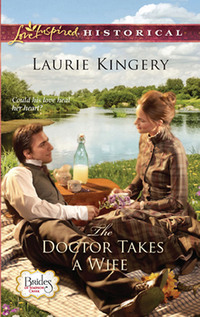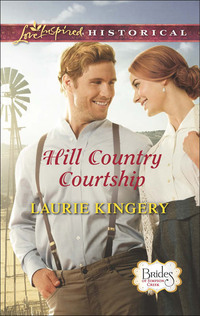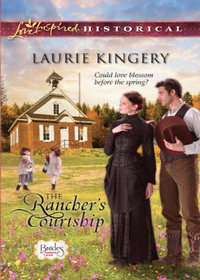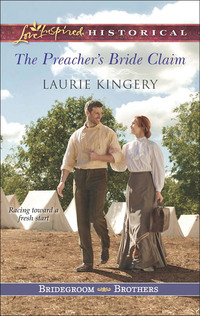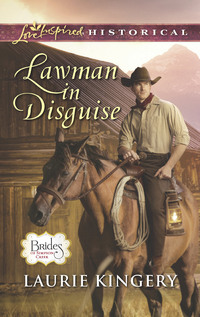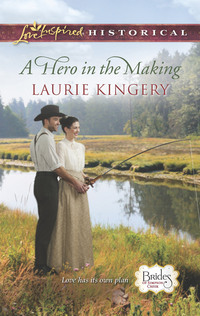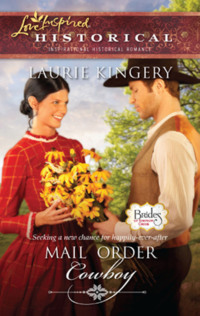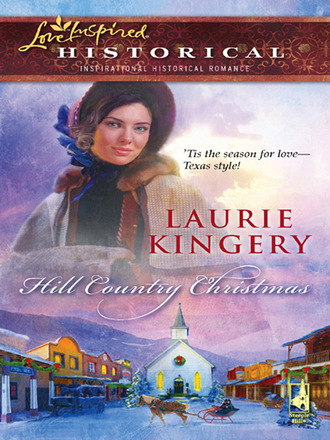
Полная версия
Hill Country Christmas
However, despite the fact that the encounter had taken no more than a minute at most, Jude couldn’t quash the primitive stab of jealousy that arrowed through him as he saw Delia gift the man with a warm wave of farewell. Involuntarily his hand clenched into a fist as he watched the other man linger to eye the gentle sway of Delia’s hips as she walked down the street away from the bank.
“Care for more coffee, sir?” purred a voice near his ear, and he looked up to see the waitress standing there, steaming pot in hand. She was pretty in a commonplace way, but she grinned as if they were old friends. “I’m Polly. New in town, ain’t ya?” She batted darkened lashes at him and he smelled traces of a cheap floral perfume.
“Thanks,” he said, deliberately ignoring her inquiry and not giving his name in return. In a small town like this she would already know that he was a stranger, anyway. He extended his cup, his gaze returning to the view out the window. Once his coffee had been refreshed, however, the waitress showed no signs of leaving.
“Who’s that fancy gent standing at the bank door?” he asked, the more to keep her from asking him any further personal questions than from a real desire to know.
She put a hand above her eyes to shade them against the glare, then peered through the dusty glass, squinting. For a moment Jude thought she might actually be too nearsighted to answer him. But then she leaned down again.
“Why, that’s Charles Ladley, the mayor’s son,” she said, sighing. “He sure is a good-looking fella. Wish he’d smile at me like that, though I doubt it’ll do that Keller girl any good neither.”
“What do you mean?” Jude kept his voice casual. He knew it was none of his business, but he couldn’t seem to keep himself from asking.
Polly gave an elaborate shrug. “Birds of a feather flock together, they say, and the Ladleys have always been as rich as King Midas. The preacher’s granddaughter—Delia Keller, that’s who he was talkin’ to—don’t have two pennies to rub together. ’Specially now that Reverend McKinney’s gone and died. Wouldn’t be surprised if she don’t have to come here and work ’longside a’ me.” There was a trace of satisfaction in her tone as she turned back to Jude.
If only you knew, Jude thought. With Delia’s status about to change radically, she and the mayor’s son would now be on equal footing. Any impediments to a relationship between them were about to melt like icicles in a Texas summer.
Aloud, he said, “Miss Polly, I’m sure the right man is out there, just looking for you. And when you find each other,” he added, trying to sound encouraging, “he’ll be so perfect for you, you’ll be glad you didn’t waste your time with that fellow.” He kept his eyes on Ladley, who was finally entering the bank.
The waitress’s eyes brightened. Jude realized that if he wanted her to go away soon and leave him to his thoughts, he’d said exactly the wrong thing.
“My, that’s an awfully sweet thing for you to say, in spite a’ bein’ a stranger an’ all that,” she gushed in that suggestive voice that wasn’t nearly as inviting as she apparently thought it was. She glanced quickly over her shoulder in an obvious effort to make sure the hotel owner wasn’t watching, then leaned closer. “Where did you say you was from?”
“I didn’t say,” he said, his gaze swinging back to the window, hoping she got the hint.
But Polly was nothing if not tenacious. “You plannin’ on stayin’ ’round these parts? I have to work till seven, but after that I could show you around the town.”
That would take all of about five minutes, he thought. “Thank you, Miss Polly, but I—”
“Or we could go to the church social next Saturday night,” she interrupted. “I know about everyone in Llano Crossing, so that’d be a real nice way to meet folks….”
He felt a twinge of pity for the girl. He hadn’t even given her his name, and here she was laying out the welcome mat. He held up a hand, knowing he had to stem her flow of eagerness. “Miss Polly, much as I appreciate your kindness, I’m not sure what my plans are just yet. I’m not planning on staying long in Llano Crossing, nice as it is. I’m either going to be riding along tomorrow or doing some odd jobs for a while before I head back West.”
Polly’s face fell and her overbright eyes dimmed. “Sure. I understand—just wanted to be neighborly, that’s all. Will you have some peach pie for dessert?”
Jude shook his head and asked her how much he owed. He would have liked some pie, but he thought it best to leave so the waitress could regain her composure. He left her an extra ten cents in addition to the dollar he owed for the meal.
Striding back into the early afternoon sunlight, Jude pondered his options. He could go to the saloon, he supposed.
In the war, he’d spent time in taverns with some of his men—too much time—between the horrendous campaigns that had led to too many lost and shattered lives. Nothing good had ever happened to him, or anyone else as far as he could see, anywhere near such a place. He’d met Nora, after all, as he was coming out of a tavern in Virginia, his judgment clouded with whiskey.
Stop thinking about her. It’s over. You have to learn from it and go on.
Resist the devil, and he will flee from you, the Scriptures promised. All very well, but if he wasn’t going to seek out a card game, what was he going to do with himself?
The smartest thing, he mused, would be to get his horse, Shiloh, out of the livery stable and ride west out of Llano Crossing. He could stop when he felt tired, sleep under the stars and live off the land between here and Nevada. He wouldn’t have to feel responsible for watching over Delia Keller as she navigated her new life of comfort and ease. It looked like there was an even chance the mayor’s son would be more than willing to take over that responsibility.
But didn’t he have a moral obligation to his dead friend, Will Keller, to make sure his orphaned daughter was going to be all right, even if he wasn’t going to marry Delia?
In any case, it was a waste of money to leave Llano Crossing today when he was paid through tonight at the hotel. Tomorrow he needed to have a plan, but tomorrow was soon enough. In the meantime, Shiloh was standing idle in his stall in the livery stable, no doubt eating his head off the unaccustomed rich grain and hay. Maybe the best thing to do was take the stallion on a run over the hills around Llano Crossing. They’d return in the evening, tired but content, and hopefully the silver buckskin’s mile-devouring gallop would have left Jude Tucker’s demons far behind.
Within fifteen minutes, Shiloh was saddled and showing his heels to the little town. For the rest of the afternoon and into the early evening, Jude and his mount explored the rolling limestone-and-cedar-studded hills, climbing until the Llano River showed as little more than a winding silver ribbon next to a collection of matchstick buildings of the town. Hawks soared overhead, taking advantage of the updrafts. Mockingbirds and crows darted among the mesquite trees and cedars, and occasionally he spied a roadrunner, darting here and there in search of the insects and snakes on which it fed.
Occasionally he spied a ranch house with outbuildings and a corral, and he knew he ought to stop and inquire if the owner needed another hand, but he felt no strong compulsion. He was enjoying the solitude and the opportunity it gave him to think.
The sun was warm on his back. He remembered, as he paused to let Shiloh drink from a cottonwood-shaded creek, how he had once used such solitary rides to gain inspiration for his sermons. It all seemed like a hundred years ago.
In those carefree days, he’d had no bigger concerns than planning next Sunday’s service and wondering and praying about when the Lord was going to provide him with a wife. Every man needed a wife, but a bachelor-preacher surely had more need than most, so as to keep his concentration on the Lord’s work. Fully half a dozen unmarried misses plus a widow or two decorated his front pew every Sunday morning, smiling up at him, but none of them had seemed quite right for him. Surely the Lord would shine a special light on the woman who was meant to be his wife, wouldn’t He? But as yet, no such illumination had been provided.
Then the shadow of war had cast itself across the land, and Jude sensed this wasn’t the time to be marrying and leaving a wife behind, her belly perhaps swelling with his child, a woman who might become a widow. The Lord was calling him to serve as one of His representatives in the army. There was time enough to think about marrying when the war was over, when—if—he resumed his position at the Mount Mulberry Church. A lot could happen during a war, he’d known, but as it turned out, he hadn’t guessed the half of it.
And then the war, and the things he’d done during the war, had changed him so completely that there seemed to be no point in even trying to return to Mount Mulberry and its church. He wasn’t fit to be its or anyone else’s pastor anymore.
With twilight drawing on, Jude and Shiloh had descended the hills and rejoined the road back to town. Jude had been humming “Tenting Tonight,” an old Civil War tune, when a shot rang out in the distance, echoing among the hills. The stallion stopped stock-still, his ears pricked forward. He gave a snort and then whinnied as if responding to a call.
Jude stopped humming, listening, too, and then he heard it—the faint cry of a man somewhere off the road among the dense mesquite and cedar. He urged his stallion off the road, navigating carefully among the cacti, the shrubs and the low trees, and after a few moments, he found the old man.
He was sitting alone on a limestone boulder, cradling his right arm, his floppy-brimmed hat shading his features.
“Howdy, stranger. I sure was thankful to hear you coming. I think this arm is broke. I tried walking, but I got to feelin’ kinda fainty-like.”
Jude dismounted. “What happened?” he asked, going toward the man.
“I rode out here just to have a glimpse at my old spread. Used t’ live here afore me and the missus got too old t’ be ranchin’ anymore and moved t’ town. I sold my acres to the neighboring rancher, even though I never thought much a’ Dixon Miller. Anyway, I was ridin’ along an’ someone fired a shot—not at me, I think, but real close t’ the road, like. My fool horse was so spooked, he threw me and took off,” he admitted with a rueful grin. “Didn’t see him run past ya, did ya?”
Jude admitted he hadn’t.
“Don’t know where he’s got to, though it wouldn’t surprise me none if Miller’s boys find him and put him in with their stock. All I wanted was just a glimpse of our old home,” he said wistfully, then he straightened. “James Heston’s the name,” the old man said, extending his other hand, though he grimaced when he loosed his careful hold on the broken right arm. His face was craggy and lined but his gaze honest and direct.
“Jude Tucker. Let me help you onto Shiloh, here, and we’ll get you into town. Is there a doctor in Llano Crossing?”
The old man gave a mirthless snort. “None I’d send my worst enemy to, let alone go myself. There isn’t any need, anyway. Nothing feels out of place.” He felt along the forearm as if to demonstrate, wincing as he did so. “My ranch is just over that ridge. If you could just help me get home, Jude Tucker, I’ll be fine. And I’m sure my missus will give you supper by way of thanks.”
Jude assisted Heston to mount, thankful that Shiloh was even-tempered enough not to mind a strange rider, especially one who trembled slightly with the effort to raise his foot to the near stirrup. Then he walked alongside the buckskin in the direction of town.
They found Heston’s horse halfway back. The beast had apparently cut across country and was calmly grazing. Jude mounted him rather than put Heston to the trouble of changing horses, and they rode on to Heston’s house.
“That was delicious, Mrs. Heston,” Jude said, two hours later, as he pushed himself back from the table and the remains of a dinner of fried chicken, black-eyed peas, corn bread and peach pie—it seemed as if he was fated to have peach pie today, even though he’d declined it at the hotel.
The comfortably plump woman with strands of iron-gray hair coming loose from her bun beamed at him. “My goodness, Mr. Tucker, it was the least I could do after you were kind enough to bring my Jim home,” she said, bestowing a smile of immense warmth. “It’s such a rare treat to have company, in any case.”
“My wife is the best cook in these parts,” James Heston bragged. He hadn’t eaten that much himself, even though his wife had cut up his chicken and buttered his corn bread so that left-handed eating would be easier. His forearm was splinted now and lying in a makeshift sling of bright yellow calico, so perhaps the pain had dimmed his appetite.
She beamed. “Thank you, Jim. And what brings you to these parts, Mr. Tucker?”
“Just passin’ through,” he said. “I’ve been mining out in Nevada, but I had to come here…on some business,” he said, deliberately being vague. “I’ll be heading west again, soon as I raise a little traveling stake.”
Heston’s eyes met those of his wife. “Lookin’ for work, are you?” Heston inquired.
Jude shrugged. “I might be. I’ve done some carpentry, but I can turn my hand to most anything.”
“I’m going to need some help around here with the chores for a little while, till this bone knits itself back together. And you saw when we came in from the barn that I’m in the midst of addin’ on a room to the back.”
Jude nodded. Heston was about halfway through framing the addition, from the looks of things.
“We couldn’t pay you much, but we’d include room and board for as long as you want to stay. It’d certainly be cheaper than the hotel or the boardinghouse.”
Jude was aware that both the elderly man and his wife were holding their breath awaiting his answer. Surely their offer was an answer to a prayer he hadn’t even prayed yet.
“Thank you. I’d be pleased to do that for a spell, Mr. Heston,” he said, humbled by their kindness to a stranger.
Конец ознакомительного фрагмента.
Текст предоставлен ООО «ЛитРес».
Прочитайте эту книгу целиком, купив полную легальную версию на ЛитРес.
Безопасно оплатить книгу можно банковской картой Visa, MasterCard, Maestro, со счета мобильного телефона, с платежного терминала, в салоне МТС или Связной, через PayPal, WebMoney, Яндекс.Деньги, QIWI Кошелек, бонусными картами или другим удобным Вам способом.


